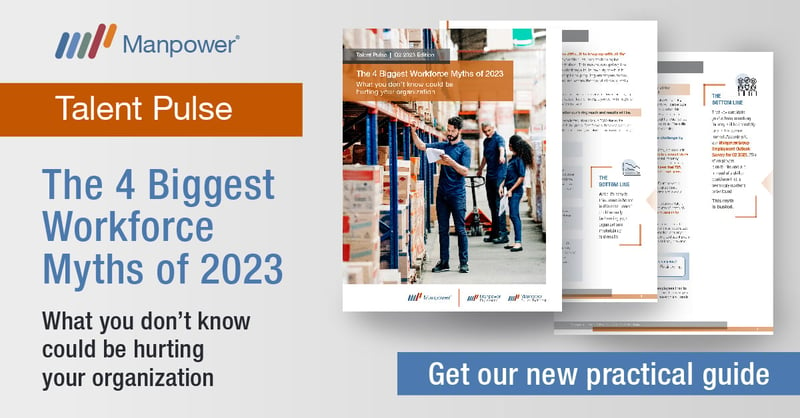How can employers attract and retain talent by helping workers to thrive?
What does it mean to thrive at work? The answer will vary, but since the pandemic many have re-evaluated their work and life priorities. The conclusion? Today’s workers want more. They want to be empowered to grow, nurture their mental fitness and physical well-being, find meaning and purpose in their work, and define success on their own terms. After two years of surviving, people want to thrive. Amid the highest talent shortage in 16 years, employers must listen, rethink and act to attract and retain the very best talent. We asked over 5,000 workers from around the world (Australia, France, Italy, United Kingdom and United States) what they need to thrive at work. We then took it a step further by partnering with leading behavior change technology company Thrive to help employers turn insights into action to ensure both organizations and individuals alike are resilient and primed to succeed:
1. Pushing the Flexibility Frontier: Understand What Flexibility Means for All.
The recent rapid adoption of hybrid and remote working paved the way for many workers to redefine work with more control, choice and flexibility. It’s this flexibility, in many different forms, that will be the lasting legacy of the pandemic, with almost all U.S. workers (92%) now saying that they need flexibility to thrive at work. But what does flexibility at work mean? We’re not just talking about knowledge workers being able to work remotely and flex their schedule around other priorities; workers across all sectors and job roles are asking for more flexibility. What we heard is that workers want more control: 38% of U.S. workers would like to choose start and end times, while 37% want to choose where they work based on their daily needs and 61% would work a four-day compressed work week to achieve better balance. There is no one-size-fits-all solution but by offering choice and flexibility employers will succeed in attracting and retaining talent.
2. Rewriting The Rules of Leadership: Prioritize Trust and Support
Workers are looking for more when it comes to their relationship with work and their employers. Mutual trust, a supportive environment and meaningful work are essentials for workers to thrive, and they are willing to vote with their feet to get it. Leaders today need to combine meaningful, purpose-driven work (important to 74% of U.S. workers) with a strong culture of trust right across the organization as workers say both trusted colleagues (82%) and leaders (80%) are central to thriving at work. To achieve this, organizations must equip managers and leaders with the right skills to manage empathetically and effectively, providing guidance, support and coaching to nurture potential and enhance the employee experience.
3. Thriving – The How To: Respond to Women and Men’s Differing Needs
In the wake of the pandemic, women and men have differing priorities and flexibility needs. Overall, flexibility at the start and end of the day (49% women; 42% men) is more important than extra vacation time (33% women; 39% men). Working for organizations with shared values (69% women; 65% men) that provide mental fitness support (60% women; 54% men) are also key factors. Employers who take steps now to offer both women and men the flexibility they need to thrive will have the greatest chance of attracting and retaining the best talent from the widest pool.
4. Forging A Family Friendly Future: Support Parents’ Priorities
The collision of home, work and school life over the past two years has led parents to reassess and reprioritize their lives. Flexibility tops the bill when it comes to what parents want, particularly choosing when they start and finish work, but that’s not all. Parents have tuned in to the importance of balance, well-being and belonging at work, and they are willing to walk to get it; in recent months parents have left their jobs in greater numbers than non-parents. It’s critical that employers listen to working parents and offer the flexibility they need to thrive, including opportunities for career progression (75%); and to learn new skills (73%); with help to stay healthy (56% want fitness resources; 54% want healthy food options).
5. Fighting Burnout, Building Mental Fitness: Move From Awareness to Action
Mental well-being is no longer a ‘nice to have;’ an effective strategy to promote mental fitness is increasingly critical to business success. One in four (25%) workers now actively want more mental health support from employers to protect against burnout. However, despite growing awareness of the importance of managing mental wellbeing, 29% of U.S. workers have not used mental health resources at work or are unaware that these exist. A powerful step employers can take is to destigmatize conversations around mental health, raising awareness and putting support in place. Mental health concerns won’t be solved overnight but it’s important for employers to create work environments where mental health is better understood, acknowledged and protected for the long-term well-being of their employees.
The future of work is far from certain, but a resilient and thriving workforce is critical for organizations to successfully navigate intensifying talent shortages and the ongoing repercussions of the pandemic. Workers are asking for more flexibility and, ultimately, more choice. The employers who are willing to stop, listen and take action to provide what workers need to thrive will reap the rewards.







Comments